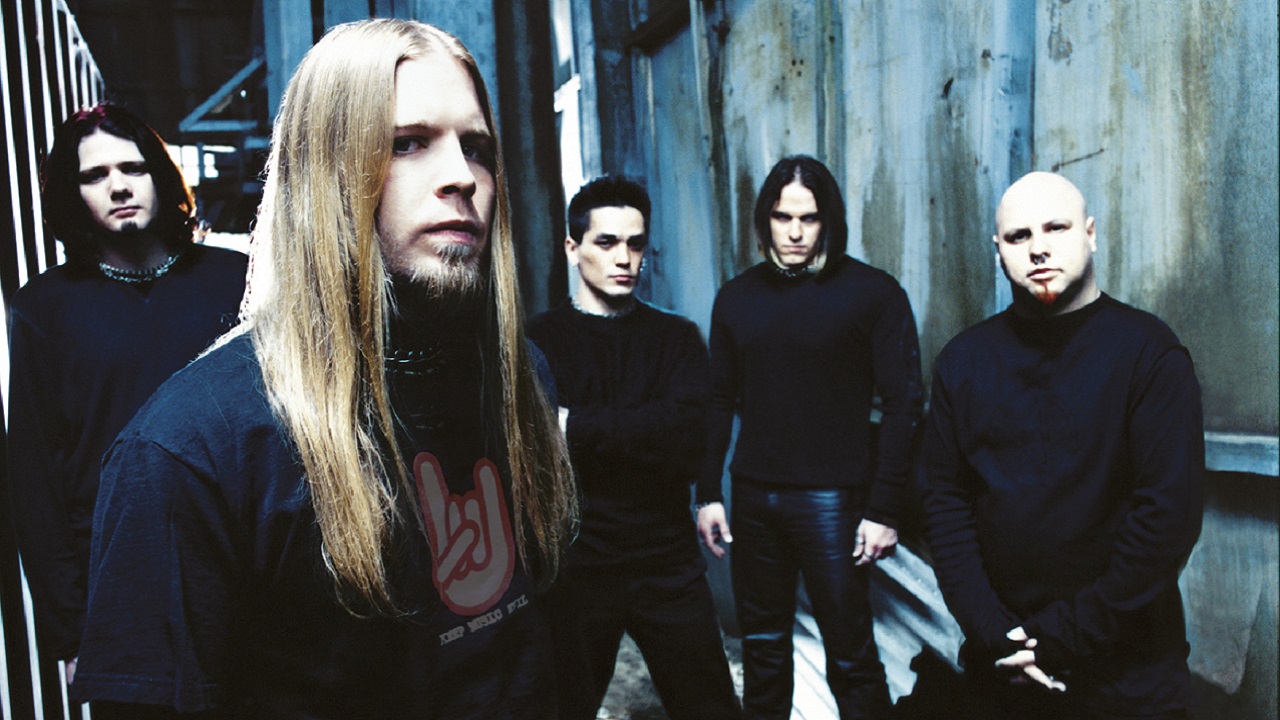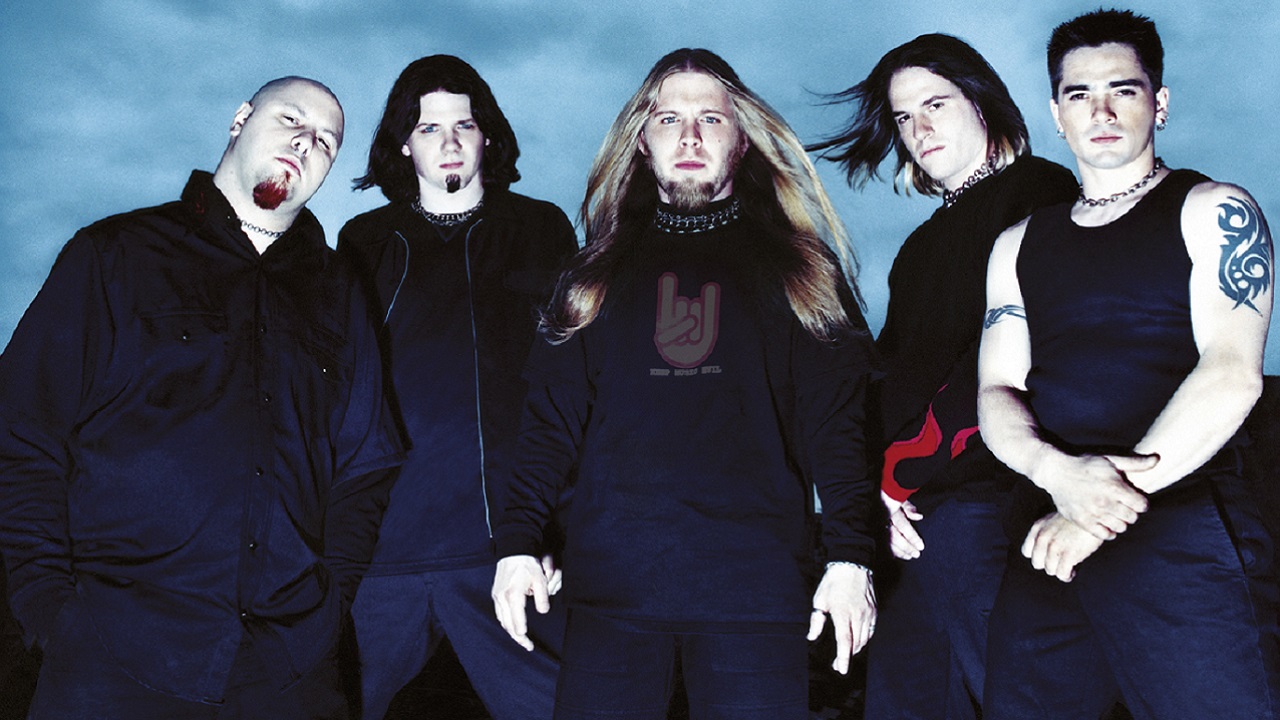
In the early 2000s, it seemed like every band had at least one massive, floor-filling anthem in them, and Soil were no exception. The Chicago five-piece might have been musically and visually out of step with prevailing nu metal trends, but their 2001 single Halo became as inescapable a rock club banger as Drowning Pool’s Bodies or Alien Ant Farm’s cover of Michael Jackson’s Smooth Criminal.
“When we wrote Halo, we never expected it to do as well as it did,” admits bassist and founding member Tim King. “But people went apeshit.”
Soil started as a side-project of Oppressor, a death metal band formed by Tim and guitarist Adam Zadel in the early 90s. They’d seen the underground metal scene changing, and they weren’t keen on where it was heading. “The Norwegian [black metal] scene became super-popular and guys were covering their faces in corpsepaint and singing about Satan,” Tim recalls. “We weren’t into that Satanic stuff and there was no way we were gonna paint our faces!”
Instead, Tim, Adam and drummer Tom Schofield drafted in guitarist Shaun Glass from fellow Chicago natives Broken Hope and gravel-throated vocalist Ryan McCombs to form Soil. They took their name from the old Entombed track Rotten Soil, and they shared a groove with the Swedish death’n’roll pioneers. They were death metal musicians playing the kind of music they’d grown up listening to.
“We wanted to get back to our roots,” says Tim. “More early Metallica, Black Sabbath, Corrosion Of Conformity.”
At the same time, nu metal was taking off and Soil found themselves swept up in the tide. “We downtuned everything and got lumped in with that whole nu metal category,” Tim admits. “We weren’t really going for that at the time – more stoner rock with downtuned guitars I guess, but we were playing with bands like Disturbed and Chevelle and got included.”
Soil’s first show was the tipping point that took them from side-project to main concern. It took place at legendary Chicago club Metro on March 31, 1998, where they were opening a bill featuring Ultraspank, Far and headliners Incubus. “It was completely sold out,” Tim recalls. “[Incubus’s second album] S.C.I.E.N.C.E. was blowing up. People just went crazy and we were like, ‘Wow, maybe we have something here, maybe we’ve taken death metal as far as it can go.’”
Soil released their debut album, Throttle Junkies, the following year via independent label MIA. Although it failed to set the world on fire, it caught the attention of Larry Jacobson, an A&R executive with major label subsidiary Giant Records. After flying out to see Soil live, he was so impressed he offered them a deal. The only problem was that MIA weren’t going to let them go for free.
“MIA wanted a million-dollar buy out,” Tim recalls. “Larry took us out to dinner and told us, ‘I flew out here to sign either you guys or Disturbed. After the show I just saw tonight, I really want you guys.’ He said they could do maybe $100,000 and a share of the profits and our label said, ‘No.’ Giant ended up signing Disturbed and the rest is history.”
To make matters worse, not only did MIA cost Soil a major record deal, the label folded two months after Throttle Junkies was released. Now unsigned, they knew they needed to act fast if they were going to survive. Aware that Disturbed had made a big splash with their debut album, The Sickness, Soil tapped up that record’s producer, Johnny K, to help them work on new demos and refine their sound.
“Throttle Junkies was recorded by [famed underground producer] Steve Albini, but he just pushed play and captured us in this raw, energetic form,” Tim explains. “At that point, we really needed some direction that we didn’t get. Johnny K got hold of us and really helped us hone our sound, and we owe him so much for that.”

The band worked on three songs with Johnny K – Need To Feel, My Own and their hit-in-the-making, Halo. While on the surface Halo appeared to explore a destructive relationship, Tim says that the song was actually a response to everything the band had experienced up to that point.
“Ryan wrote Halo about his love-hate relationship with the music industry,” says the bassist. “He loved the music, the fans and going out to play, but he hated having to play the industry game in order to let your music be heard.”
A demo version of Halo was uploaded to Demo Diaries, a website used by A&R reps to discover unsigned talent. Soil were soon contacted by someone from Atlantic Records wanting to release Halo to the Florida-based radio station WJRR to see if it would generate any buzz.
“It blew up,” Tim gleefully recalls. “After that, every major label flew out to Chicago to make offers. Atlantic just couldn’t match some of these offers we were getting in. We let the jackpot grow and grow until we signed with [legendary music mogul] Clive Davis at J Records and went back to the studio with Johnny K. While we were in the studio working on Scars, Halo was blowing up on radio. We had a hit single before we even put out the record.”
Halo peaked at No.22 on Billboard’s Mainstream Rock Tracks, though its parent album, Scars, didn’t equal that success, peaking at No.193 on the Billboard 200. Though the fact that it was released on September 11, 2001 probably didn’t help its chances.
“Scars probably could have gone platinum if 9/11 hadn’t happened,” says Tim. “It was soaring on the radio, we’re playing all these huge shows, and then on the day it came out I went to my local Walmart and there was absolutely nobody there. People were too afraid, so they just stayed home. And Scars was a very angry and heavy record – people wanted to be uplifted, so P.O.D. with their song Alive blew up because people needed those uplifting things.”
Still, Halo had so much wind in its sails that even the tragedy of 9/11 couldn’t completely derail things for Soil. The video, featuring the band playing a house party gig that saw them climbing the walls and bringing the house down, went into heavy MTV rotation.
“That video was so surreal!” Tim exclaims. “It was the first we’d ever filmed, and they spared no expense. They built this house in an airport hangar and all those stunts you see us do, they’re for real, not camera tricks. I was literally walking up walls, hooked up to wires.”
Within weeks of Scars’ release, Soil were out on the road, playing to more than 10,000 people every night on the Merry Mayhem tour alongside Ozzy Osbourne, Rob Zombie and Mudvayne. “That was the tour that sent us over the edge,” Tim says. “Our bus used to park right next to Zakk Wylde’s, and Zakk would invite us on to drink. He would go through two cases of beer and a bottle of Crown Royal [Canadian whisky] every night! We were just 20-something kids who’d get a buzz from three beers, so we’d end up crawling off the bus!”
More success awaited the band when they made it over to the UK. Scars was released in Britain in January 2002, four months after it came out back home. By that point, word had spread about Soil and the buzz was deafening.
“We flew over to do one show at the Camden Underworld and when we got there, there was this huge line going around the block waiting to get in,” Tim says. “They had to stop letting people join, because there were hundreds of people who clearly couldn’t get into this 500-capacity club! People in the UK understood what Soil were about right away.”
When the band returned three months later to play with Skindred and Adema, every show was sold out. “People were going crazy; Halo was an instant hit in the clubs,” says Tim. “It’s still in rotation today, I believe! The UK is basically our Graceland.”
Not everyone was enjoying the ride, however. Frontman Ryan quit the band shortly after the release of their third album, 2004’s Redefine, tired of having to deal with the music industry bullshit that came with being in a band. He took a year out before joining Drowning Pool for a six-year, three-album stint between 2005 and 2011. It would be Halo’s enduring success in the UK that eventually brought him back into the Soil fold.
“We’d been talking to Ryan and his time with Drowning Pool was coming to an end,” recalls Tim. “So we said, ‘It’s the 10th anniversary of Scars… why don’t you come back and we can tour the UK?’ We sorted out some of our past issues, because he hadn’t left on the best of terms, and we filmed [greatest hits live album CD/DVD] Re-LIVE-Ing The Scars in London [in October 2011]. It just all came back and we’ve never looked back.”







